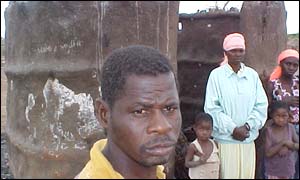|
Elderly 'Witches' Persecuted in Mozambique
By Tim Judah, BBC News
July 3, 2002
Africa

A victim of witchcraft accusations at his burnt home
There has been an alarming increase in accusations of witchcraft in Mozambique.
These frequently lead to elderly women being kicked out of their families.
There have also been reports of murders and violent attacks linked to witchcraft accusations.
The increase in accusations is believed to be linked to soaring rates of illness and death associated with HIV and Aids.
While there are no statistics to support the claims, academics and field workers from aid agencies report the increased influence of traditional healers or curandeiros. They frequently make accusations of witchcraft in such cases.
Abandoned
In Tete province, in central Mozambique, an area with a high rate of HIV and Aids - 21.2% - it is frighteningly easy to find people accused of witchcraft.
When two of Daina Pedro's grandchildren died, a traditional healer told her son that she had bewitched them.
Mozambican woman accused of witchcraft
Daina was accused of bewitching her grandchildren
"The healer lied," Mrs Pedro said.
"He lied a lot and used to call up the spirits to earn money. My son told his brothers. They all left and went far away."
Mrs Pedro now lives alone in an area hit by famine.
She believes in the existence of witchcraft, which is part and parcel of local tradition and belief, but says she has been accused falsely.
Unscrupulous
Zeca Chicusse, programme officer in Tete for HelpAge International, has been trying to help elderly people accused of witchcraft.
They never say it is malaria or tuberculosis. They always accuse an elder.
Zeca Chicusse, HelpAge International
His aid agency, funded by Britain's Help the Aged charity, is trying to teach people not to believe these accusations.
"Here we have a belief that if your child falls sick the first thing you do is go to the traditional healer.
"The answer is always to accuse someone in your family. To say it is your mother, your father or grandfather.
"They never say it is malaria or tuberculosis. They always accuse an elder," he said
Mozambique and Tete province
Traditional healers in Mozambique are supposed to be registered with an official organisation.
But this is not believed to be enough to stop unscrupulous curandeiros taking advantage of people's traditional beliefs or colluding with them where the motive of an accusation may be to take someone's land or cattle.
'Liars'
In June, Simon Manuel Gomes's hut was burned down by his son, who was drunk. All of Mr Gomes's possessions and food were destroyed.
This happened after his son had visited a curandeiro. The healer had told him that his impotence was a result of him having been bewitched by his own father.
"All I know is that most healers are liars," Mr Gomes said as he looked despondently at the charred remains of his hut.
Necodemus Chipfupa, head of HelpAge International in Mozambique, says that the accusations of witchcraft are increasing because of Aids.
He says it is happening in his native Zimbabwe and across the rest of southern Africa.
Mr Chipfupa says Aids means big money for the curandeiros because people are sick for longer.
"The healers charge for a consultation. They charge for medicine and also to 'cleanse' the compound."
"When they do that they get paid in animals or big sums of money," he says.
Healers can help
Not all Mozambicans believe that the influence of traditional healers is entirely malign.
Young Mozambican malaria victim
Malaria and others diseases are often blamed on "witches"
Professor Ricardo Duarte believes there are victims but, in general, the traditional healers "do more good than harm".
When it comes to fighting disease, Professor Duarte, who teaches ethnography at Maputo University, believes that curandeiros help people.
This is particularly the case in areas where there are few, if any, formal medical services.
"They act on the psychological side," he explains, "giving the person the impression of fighting the disease."
"People are convinced that they are 'armed' so the body gets more strength. It is a benefit. Some don't use the right techniques but it is not all bad."
More Information on World Health Issues
Copyright © Global Action on Aging
Terms of Use |
Privacy Policy | Contact
Us
|



